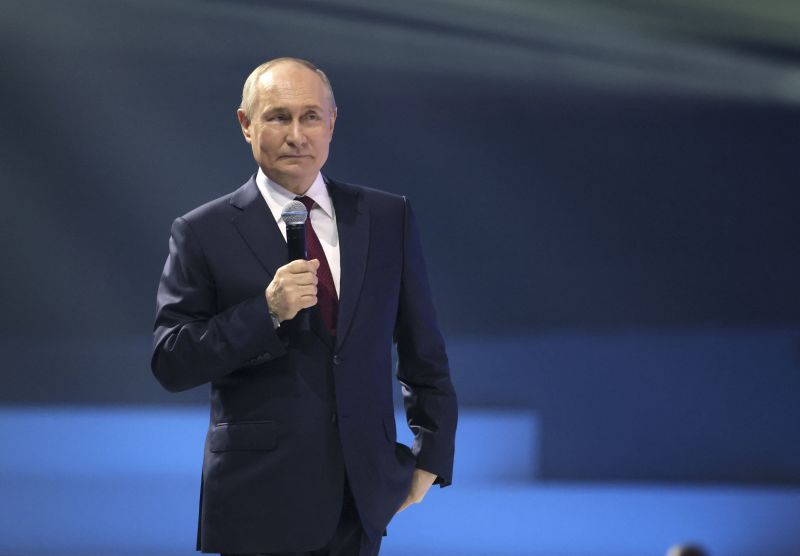Putin on the Path to Power: Your Guide to Russia's Upcoming Presidential Election
 The upcoming Russian presidential election is poised to solidify Vladimir Putin's grip on power for another term as he navigates various challenges and opposition within the country and on the international stage. Here's what you need to know about the election process, candidates, and potential implications for Russia and the world.
Election Process:
The Russian presidential election is scheduled to take place in 2024, following the completion of Putin's current term in office. The election process in Russia has been criticized for lacking transparency and fairness, with allegations of voter fraud and suppression of opposition. In recent years, various opposition leaders and political figures have faced challenges in participating in the electoral process, raising concerns about the legitimacy of the results.
Candidates:
While the full list of candidates for the 2024 election has yet to be finalized, it is widely expected that Vladimir Putin will run for another term. Putin, who has been in power since 2000, continues to enjoy strong support among a significant portion of the Russian population. His popularity stems from his tough stance on national security, efforts to restore Russia's status as a global power, and promise of stability in a politically volatile region.
Potential Implications:
Another term for Putin would likely mean a continuation of Russia's assertive foreign policy, which has been a cause of concern for Western countries and neighboring states. Putin's administration has been accused of meddling in foreign elections, supporting authoritarian leaders in other countries, and engaging in cyber warfare. A prolonged stay in power could further strain Russia's relations with the West and deepen the existing rift between Moscow and Western capitals.
Domestically, Putin's re-election could also have significant implications for the Russian population. Critics argue that under Putin's rule, political freedoms have been curtailed, dissent has been suppressed, and corruption has remained rampant. A continuation of the status quo could lead to further erosion of democratic institutions and exacerbate social and economic inequalities within the country.
In Conclusion:
As Russia's presidential election approaches, all eyes will be on Vladimir Putin as he vies for another term in office. The outcome of the election will not only shape the future of Russia, but also have far-reaching implications for international relations and global politics. Whether Putin's bid for re-election is met with widespread support or mounting opposition remains to be seen, but one thing is certain - the world will be watching closely as Russia heads towards a pivotal moment in its political history.
The upcoming Russian presidential election is poised to solidify Vladimir Putin's grip on power for another term as he navigates various challenges and opposition within the country and on the international stage. Here's what you need to know about the election process, candidates, and potential implications for Russia and the world.
Election Process:
The Russian presidential election is scheduled to take place in 2024, following the completion of Putin's current term in office. The election process in Russia has been criticized for lacking transparency and fairness, with allegations of voter fraud and suppression of opposition. In recent years, various opposition leaders and political figures have faced challenges in participating in the electoral process, raising concerns about the legitimacy of the results.
Candidates:
While the full list of candidates for the 2024 election has yet to be finalized, it is widely expected that Vladimir Putin will run for another term. Putin, who has been in power since 2000, continues to enjoy strong support among a significant portion of the Russian population. His popularity stems from his tough stance on national security, efforts to restore Russia's status as a global power, and promise of stability in a politically volatile region.
Potential Implications:
Another term for Putin would likely mean a continuation of Russia's assertive foreign policy, which has been a cause of concern for Western countries and neighboring states. Putin's administration has been accused of meddling in foreign elections, supporting authoritarian leaders in other countries, and engaging in cyber warfare. A prolonged stay in power could further strain Russia's relations with the West and deepen the existing rift between Moscow and Western capitals.
Domestically, Putin's re-election could also have significant implications for the Russian population. Critics argue that under Putin's rule, political freedoms have been curtailed, dissent has been suppressed, and corruption has remained rampant. A continuation of the status quo could lead to further erosion of democratic institutions and exacerbate social and economic inequalities within the country.
In Conclusion:
As Russia's presidential election approaches, all eyes will be on Vladimir Putin as he vies for another term in office. The outcome of the election will not only shape the future of Russia, but also have far-reaching implications for international relations and global politics. Whether Putin's bid for re-election is met with widespread support or mounting opposition remains to be seen, but one thing is certain - the world will be watching closely as Russia heads towards a pivotal moment in its political history.
If you would like to delve into the world of investment topics , go to our partner project Wall Street Wizardry
